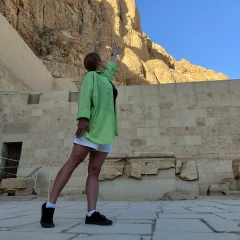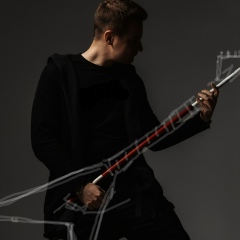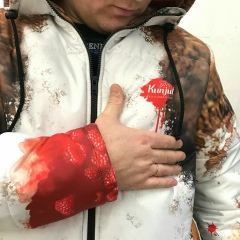Как известно, сначала славяне были язычниками. На каждый вид деятельности им полагалось по богу. Так, известен бог аппетита Жор, бог сна Масса и бог питья Поехали. Чтобы задобрить своих богов, славяне приносили им в жертву труд.
1) Утварь того времени была нехитрой. Утварь в данном случае пишетсявместе.
И уже лет двести как не является ругательством. Основным предметом утвари уславян был горшок. Из него люди днем ели, а ночью ставили его под кровать,чтобы утром еще поесть. К горшку прилагалась ложка. Ею славяне били по лбу тех, кто ночью неправильно использовал горшок.Больше у славян утвари не было.
2) В году у славян было 364 праздника и Новый год. Интересно, что Новыйгод у славян начинался не первого января, а первого декабря. А кончалсягде-то ближе к марту.
3) Любопытно, что в пищу славяне употребляли все, что не употребляли впитье.
4) Земледелие и скотоводство были славянам хорошо известны, поэтому ониими не занимались.
5) Торговать славяне не умели, а тех, кто умел, - били.
6) Основным занятием славян была критика других народов, у которых вселадилось за счет их бездуховности.
7) Славяне были прекрасные охотники, если бы охотились.
8) Славяне были вольнолюбивым народом. Их часто угоняли в рабство, но итам они не работали.
9) В неделе у славян было всего два дня. Они назывались Уик и Уэнд. Авместе Уик-энд, что в переводе со славянского значило "неделя". Интересно,что выходных дней у славян не было, а вот месяцы были. Выходным считалсямесяц Вересень. В переводе на современный календарь он продолжался с концамая по середину октября. После чего наступал месяц Лютень.Это не совсем точное название. Правильнее называть его БеЛютень. В этотмесяц все славяне лечились. Причем лечились тем, чем в предыдущий месяцкалечились.
10) Интересно, что в древнюю Москву пускали всех, а вот в древнем Киеветребовалась регистрация. Особенно для половцев и печенегов.
11) Князей славяне призывали к себе со стороны. Любой человек, назвавшийсякнязем, мог править славянами. А вот заставить их что-нибудь сделать не мог.Как правило, князьям славяне давали меткие прозвища: Красно солнышко (есликнязь был в прыщах), Мудрый (если строил туалет рядом со столовой или верилславянам на слово), Долгорукий (если фамилия князя была Коротконогий).
12) При появлении врагов славяне закрывали дверь в город и притворялись,что их нет. Если враги начинали лезть в город через стены, то славянеполивали их матом и смолой. А когда те все-таки перелезали, то извинялись ипоказывали князя, который все это придумал.
13) Славяне издревле гордились своей великой литературой. Стоит тольковспомнить "Слово о полку Игореве", чтобы понять, что вспомнить большенечего.
14) Славяне верили, что после смерти они попадают в деревянный ящик, вкотором есть все, чтобы из него не выйти.
1) Утварь того времени была нехитрой. Утварь в данном случае пишетсявместе.
И уже лет двести как не является ругательством. Основным предметом утвари уславян был горшок. Из него люди днем ели, а ночью ставили его под кровать,чтобы утром еще поесть. К горшку прилагалась ложка. Ею славяне били по лбу тех, кто ночью неправильно использовал горшок.Больше у славян утвари не было.
2) В году у славян было 364 праздника и Новый год. Интересно, что Новыйгод у славян начинался не первого января, а первого декабря. А кончалсягде-то ближе к марту.
3) Любопытно, что в пищу славяне употребляли все, что не употребляли впитье.
4) Земледелие и скотоводство были славянам хорошо известны, поэтому ониими не занимались.
5) Торговать славяне не умели, а тех, кто умел, - били.
6) Основным занятием славян была критика других народов, у которых вселадилось за счет их бездуховности.
7) Славяне были прекрасные охотники, если бы охотились.
8) Славяне были вольнолюбивым народом. Их часто угоняли в рабство, но итам они не работали.
9) В неделе у славян было всего два дня. Они назывались Уик и Уэнд. Авместе Уик-энд, что в переводе со славянского значило "неделя". Интересно,что выходных дней у славян не было, а вот месяцы были. Выходным считалсямесяц Вересень. В переводе на современный календарь он продолжался с концамая по середину октября. После чего наступал месяц Лютень.Это не совсем точное название. Правильнее называть его БеЛютень. В этотмесяц все славяне лечились. Причем лечились тем, чем в предыдущий месяцкалечились.
10) Интересно, что в древнюю Москву пускали всех, а вот в древнем Киеветребовалась регистрация. Особенно для половцев и печенегов.
11) Князей славяне призывали к себе со стороны. Любой человек, назвавшийсякнязем, мог править славянами. А вот заставить их что-нибудь сделать не мог.Как правило, князьям славяне давали меткие прозвища: Красно солнышко (есликнязь был в прыщах), Мудрый (если строил туалет рядом со столовой или верилславянам на слово), Долгорукий (если фамилия князя была Коротконогий).
12) При появлении врагов славяне закрывали дверь в город и притворялись,что их нет. Если враги начинали лезть в город через стены, то славянеполивали их матом и смолой. А когда те все-таки перелезали, то извинялись ипоказывали князя, который все это придумал.
13) Славяне издревле гордились своей великой литературой. Стоит тольковспомнить "Слово о полку Игореве", чтобы понять, что вспомнить большенечего.
14) Славяне верили, что после смерти они попадают в деревянный ящик, вкотором есть все, чтобы из него не выйти.
As you know, at first the Slavs were pagans. For each type of activity they relied on God. So, the god of appetite, Zhor, the god of sleep, Massa, and the god of drinking, Let's go. To appease their gods, the Slavs sacrificed labor to them.
1) Utensils of that time were simple. Utensils in this case are written together.
And already two hundred years as it is not a curse. The main subject of utensils was a pot. People ate from it during the day, and at night put it under the bed to eat more in the morning. A spoon was attached to the pot. The Slavs beat her on the forehead with those who misused the pot at night. The Slavs did not have more utensils.
2) In the year the Slavs had 364 holidays and the New Year. Interestingly, the New Year among the Slavs began not on the first of January, but on the first of December. And it ended somewhere closer to March.
3) It is curious that the Slavs consumed everything that they did not drink.
4) Agriculture and cattle breeding were well known to the Slavs, therefore they were not engaged in them.
5) The Slavs did not know how to trade, and those who knew how - they beat.
6) The main occupation of the Slavs was the criticism of other peoples, which were inspired by their lack of spirituality.
7) The Slavs were excellent hunters if they hunted.
8) The Slavs were freedom-loving people. They were often driven into slavery, but they did not work for the Itam.
9) In the week the Slavs had only two days. They were called Wick and Wend. Avmeste Weekend, which is translated from Slavic meant "week". It is interesting that the Slavs did not have days off, but there were months. The weekend was considered the month of Veresen. Translated into the modern calendar, it lasted from the end to mid-October. After which came the month of Lute. This is not an exact name. It is more correct to call him BeLuten. In this month all Slavs were treated. And they were treated with what they cured in the previous month.
10) It is interesting that everyone was allowed into ancient Moscow, but in ancient Kiev registration was required. Especially for Polovtsy and Pechenegs.
11) Princes Slavs called to themselves from the side. Any person who called himself a prince could rule the Slavs. But he could not get them to do anything. As a rule, the Slavs gave the princes well-known nicknames: Red Sun (if the prince was acne), Wise (if he built a toilet near the dining room or took the Slavs word for word), Dolgoruky (if the prince's name was Short-legged )
12) When enemies appeared, the Slavs closed the door to the city and pretended that they were not. If the enemies began to climb into the city through the walls, then the Slavs filled them with obscene and tar. And when they nevertheless climbed, they apologized and showed the prince who invented all this.
13) The Slavs since ancient times were proud of their great literature. It is only worth recalling the "Word of Igor's Regiment" in order to understand that there is nothing more to remember.
14) The Slavs believed that after death they end up in a wooden box, which has everything in order not to get out of it.
1) Utensils of that time were simple. Utensils in this case are written together.
And already two hundred years as it is not a curse. The main subject of utensils was a pot. People ate from it during the day, and at night put it under the bed to eat more in the morning. A spoon was attached to the pot. The Slavs beat her on the forehead with those who misused the pot at night. The Slavs did not have more utensils.
2) In the year the Slavs had 364 holidays and the New Year. Interestingly, the New Year among the Slavs began not on the first of January, but on the first of December. And it ended somewhere closer to March.
3) It is curious that the Slavs consumed everything that they did not drink.
4) Agriculture and cattle breeding were well known to the Slavs, therefore they were not engaged in them.
5) The Slavs did not know how to trade, and those who knew how - they beat.
6) The main occupation of the Slavs was the criticism of other peoples, which were inspired by their lack of spirituality.
7) The Slavs were excellent hunters if they hunted.
8) The Slavs were freedom-loving people. They were often driven into slavery, but they did not work for the Itam.
9) In the week the Slavs had only two days. They were called Wick and Wend. Avmeste Weekend, which is translated from Slavic meant "week". It is interesting that the Slavs did not have days off, but there were months. The weekend was considered the month of Veresen. Translated into the modern calendar, it lasted from the end to mid-October. After which came the month of Lute. This is not an exact name. It is more correct to call him BeLuten. In this month all Slavs were treated. And they were treated with what they cured in the previous month.
10) It is interesting that everyone was allowed into ancient Moscow, but in ancient Kiev registration was required. Especially for Polovtsy and Pechenegs.
11) Princes Slavs called to themselves from the side. Any person who called himself a prince could rule the Slavs. But he could not get them to do anything. As a rule, the Slavs gave the princes well-known nicknames: Red Sun (if the prince was acne), Wise (if he built a toilet near the dining room or took the Slavs word for word), Dolgoruky (if the prince's name was Short-legged )
12) When enemies appeared, the Slavs closed the door to the city and pretended that they were not. If the enemies began to climb into the city through the walls, then the Slavs filled them with obscene and tar. And when they nevertheless climbed, they apologized and showed the prince who invented all this.
13) The Slavs since ancient times were proud of their great literature. It is only worth recalling the "Word of Igor's Regiment" in order to understand that there is nothing more to remember.
14) The Slavs believed that after death they end up in a wooden box, which has everything in order not to get out of it.
У записи 3 лайков,
0 репостов.
0 репостов.
Эту запись оставил(а) на своей стене Тёма Уланов






















